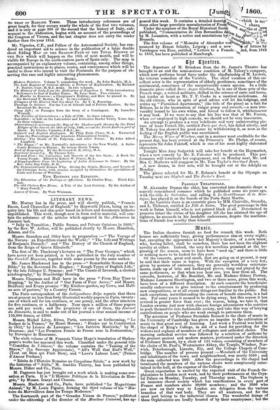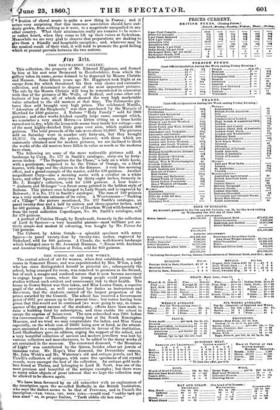Busir.
The Italian theatres furnish no food for remark this week. Both houses are sufficiently busy, giving performances almost every night ; but, excepting the appearance at her Majesty's theatre, of a new tenor, who, having failed, shall be nameless, there has not been the slightest novelty at either. Indeed, the very few novelties promised at the be- ginning of the season, seem to have been "used up," and there is little or nothing more to be looked for this year. Of the concerts, great and small, that are going on at present, it may be said that their name is legion. With the exception of a very few, given by persons of eminence, they are generally worthless entertain- ments, made up of trite and hackneyed pieces, sung and played by the same performers, so that when you hear one, you hear them all. The concerts, however, of Mr. Benedict, Mr. and Madame Sidney Pratten, Madame Lemmens Sherrington, and two or three more, given this week, have been of a different description. At such concerts the beneficiaire usually endeavours to give interest to the entertainment by producing new compositions, or at all events things not familiar to the public. But such exceptions, notwithstanding the custom of benefit concerts, is a bad one. For some years it seemed to be dying away, but this season it has revived in greater force than ever ; the reason, being, we take it, that London swarms just now with obscure foreign adventurers who contrive to push themselves into fashionable society, and take this way of levying contributions on people who are weak enough to patronize them. The accession of Professor Stemdale Bennett to the chair of music in the University of Cambridge has given an impulse to the cultivation of music in that great seat of learning. Last week a Festival was held in the chapel of Ring's College, in aid of a fund for providing for the widows and orphans of members of collegiate and cathedral choirs. The morning cathedral service was followed by a selection of anthems by the greatest ancient and modern masters, performed under the direction of Professor Bennett, by a choir of 125 voices, consisting of members of the choirs of St. Paul's, Westminster Abbey, the Temple, Windsor, Nor- wich, Peterborough, Lincoln, Ely, and the College Chapels of Cam- bridge. 'The number of persons present :—Iilembers of the University and inhabitants of the town and neighbourhood, was nearly 3500; and the sum collected was 266/. After the proceedings in the chapel had terminated the members of the various choirs were sumptuously enter- tained in the hall, at the expense of the College. Great expectation is excited by the expected visit of the French Or- pheonistes to London next week, and by their performances at the Crys- tal Palace on Monday, Tuesday, and Thursday next. The Orpheon is an immense choral society which has ramifications in every part of France and numbers above 30000 members ; and the 3000 who are now on their way to London are delegates from the various branches of that vast body. They are all amateurs, and for the most part belong to the industrial classes. The wonderful doings of these Orpheonistes are loudly boasted of by their countrymen; but the • ation of choral music is quite a new thing in Francs° ; and it seems very surprising that this immense association should have sud- denly grown, from nothing as it were, to a magnitude unequalled in any other country. What their attainments really are remains to be seen- or rather heard, when they come to lift up their voices at Sydenham. Meanwhile we are very glad to observe that preparations are making to give them a friendly and hospitable reception ; and, whatever may be the musical result of their visit, it will tend to promote the good feeling which at present prevails between the two nations.



























 Previous page
Previous page